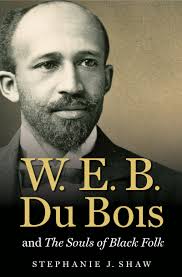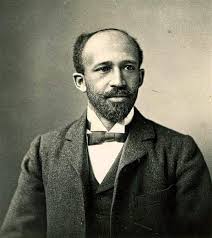The Souls of Black Folk Page #36
The Souls of Black Folk is a 1903 work of American literature by W. E. B. Du Bois. It is a seminal work in the history of sociology and a cornerstone of African-American literature. The book contains several essays on race, some of which the magazine Atlantic Monthly had previously published.
If all the black land-owners who had ever held land here had kept it or left it in the hands of black men, the Negroes would have owned nearer thirty thousand acres than the fifteen thousand they now hold. And yet these fifteen thousand acres are a creditable showing,—a proof of no little weight of the worth and ability of the Negro people. If they had been given an economic start at Emancipation, if they had been in an enlightened and rich community which really desired their best good, then we might perhaps call such a result small or even insignificant. But for a few thousand poor ignorant field-hands, in the face of poverty, a falling market, and social stress, to save and capitalize two hundred thousand dollars in a generation has meant a tremendous effort. The rise of a nation, the pressing forward of a social class, means a bitter struggle, a hard and soul-sickening battle with the world such as few of the more favored classes know or appreciate. Out of the hard economic conditions of this portion of the Black Belt, only six per cent of the population have succeeded in emerging into peasant proprietorship; and these are not all firmly fixed, but grow and shrink in number with the wavering of the cotton-market. Fully ninety-four per cent have struggled for land and failed, and half of them sit in hopeless serfdom. For these there is one other avenue of escape toward which they have turned in increasing numbers, namely, migration to town. A glance at the distribution of land among the black owners curiously reveals this fact. In 1898 the holdings were as follows: Under forty acres, forty-nine families; forty to two hundred and fifty acres, seventeen families; two hundred and fifty to one thousand acres, thirteen families; one thousand or more acres, two families. Now in 1890 there were forty-four holdings, but only nine of these were under forty acres. The great increase of holdings, then, has come in the buying of small homesteads near town, where their owners really share in the town life; this is a part of the rush to town. And for every land-owner who has thus hurried away from the narrow and hard conditions of country life, how many field-hands, how many tenants, how many ruined renters, have joined that long procession? Is it not strange compensation? The sin of the country districts is visited on the town, and the social sores of city life to-day may, here in Dougherty County, and perhaps in many places near and far, look for their final healing without the city walls. IX. Of the Sons of Master and Man Life treads on life, and heart on heart; We press too close in church and mart To keep a dream or grave apart. MRS. BROWNING. The world-old phenomenon of the contact of diverse races of men is to have new exemplification during the new century. Indeed, the characteristic of our age is the contact of European civilization with the world’s undeveloped peoples. Whatever we may say of the results of such contact in the past, it certainly forms a chapter in human action not pleasant to look back upon. War, murder, slavery, extermination, and debauchery,—this has again and again been the result of carrying civilization and the blessed gospel to the isles of the sea and the heathen without the law. Nor does it altogether satisfy the conscience of the modern world to be told complacently that all this has been right and proper, the fated triumph of strength over weakness, of righteousness over evil, of superiors over inferiors. It would certainly be soothing if one could readily believe all this; and yet there are too many ugly facts for everything to be thus easily explained away. We feel and know that there are many delicate differences in race psychology, numberless changes that our crude social measurements are not yet able to follow minutely, which explain much of history and social development. At the same time, too, we know that these considerations have never adequately explained or excused the triumph of brute force and cunning over weakness and innocence. It is, then, the strife of all honorable men of the twentieth century to see that in the future competition of races the survival of the fittest shall mean the triumph of the good, the beautiful, and the true; that we may be able to preserve for future civilization all that is really fine and noble and strong, and not continue to put a premium on greed and impudence and cruelty. To bring this hope to fruition, we are compelled daily to turn more and more to a conscientious study of the phenomena of race-contact,—to a study frank and fair, and not falsified and colored by our wishes or our fears. And we have in the South as fine a field for such a study as the world affords,—a field, to be sure, which the average American scientist deems somewhat beneath his dignity, and which the average man who is not a scientist knows all about, but nevertheless a line of study which by reason of the enormous race complications with which God seems about to punish this nation must increasingly claim our sober attention, study, and thought, we must ask, what are the actual relations of whites and blacks in the South? and we must be answered, not by apology or fault-finding, but by a plain, unvarnished tale. In the civilized life of to-day the contact of men and their relations to each other fall in a few main lines of action and communication: there is, first, the physical proximity of home and dwelling-places, the way in which neighborhoods group themselves, and the contiguity of neighborhoods. Secondly, and in our age chiefest, there are the economic relations,—the methods by which individuals cooperate for earning a living, for the mutual satisfaction of wants, for the production of wealth. Next, there are the political relations, the cooperation in social control, in group government, in laying and paying the burden of taxation. In the fourth place there are the less tangible but highly important forms of intellectual contact and commerce, the interchange of ideas through conversation and conference, through periodicals and libraries; and, above all, the gradual formation for each community of that curious tertium quid which we call public opinion. Closely allied with this come the various forms of social contact in everyday life, in travel, in theatres, in house gatherings, in marrying and giving in marriage. Finally, there are the varying forms of religious enterprise, of moral teaching and benevolent endeavor. These are the principal ways in which men living in the same communities are brought into contact with each other. It is my present task, therefore, to indicate, from my point of view, how the black race in the South meet and mingle with the whites in these matters of everyday life. First, as to physical dwelling. It is usually possible to draw in nearly every Southern community a physical color-line on the map, on the one side of which whites dwell and on the other Negroes. The winding and intricacy of the geographical color-line varies, of course, in different communities. I know some towns where a straight line drawn through the middle of the main street separates nine-tenths of the whites from nine-tenths of the blacks. In other towns the older settlement of whites has been encircled by a broad band of blacks; in still other cases little settlements or nuclei of blacks have sprung up amid surrounding whites. Usually in cities each street has its distinctive color, and only now and then do the colors meet in close proximity. Even in the country something of this segregation is manifest in the smaller areas, and of course in the larger phenomena of the Black Belt.
Translation
Translate and read this book in other languages:
Select another language:
- - Select -
- 简体中文 (Chinese - Simplified)
- 繁體中文 (Chinese - Traditional)
- Español (Spanish)
- Esperanto (Esperanto)
- 日本語 (Japanese)
- Português (Portuguese)
- Deutsch (German)
- العربية (Arabic)
- Français (French)
- Русский (Russian)
- ಕನ್ನಡ (Kannada)
- 한국어 (Korean)
- עברית (Hebrew)
- Gaeilge (Irish)
- Українська (Ukrainian)
- اردو (Urdu)
- Magyar (Hungarian)
- मानक हिन्दी (Hindi)
- Indonesia (Indonesian)
- Italiano (Italian)
- தமிழ் (Tamil)
- Türkçe (Turkish)
- తెలుగు (Telugu)
- ภาษาไทย (Thai)
- Tiếng Việt (Vietnamese)
- Čeština (Czech)
- Polski (Polish)
- Bahasa Indonesia (Indonesian)
- Românește (Romanian)
- Nederlands (Dutch)
- Ελληνικά (Greek)
- Latinum (Latin)
- Svenska (Swedish)
- Dansk (Danish)
- Suomi (Finnish)
- فارسی (Persian)
- ייִדיש (Yiddish)
- հայերեն (Armenian)
- Norsk (Norwegian)
- English (English)
Citation
Use the citation below to add this book to your bibliography:
Style:MLAChicagoAPA
"The Souls of Black Folk Books." Literature.com. STANDS4 LLC, 2025. Web. 11 Jan. 2025. <https://www.literature.com/book/the_souls_of_black_folk_310>.




Discuss this The Souls of Black Folk book with the community:
Report Comment
We're doing our best to make sure our content is useful, accurate and safe.
If by any chance you spot an inappropriate comment while navigating through our website please use this form to let us know, and we'll take care of it shortly.
Attachment
You need to be logged in to favorite.
Log In